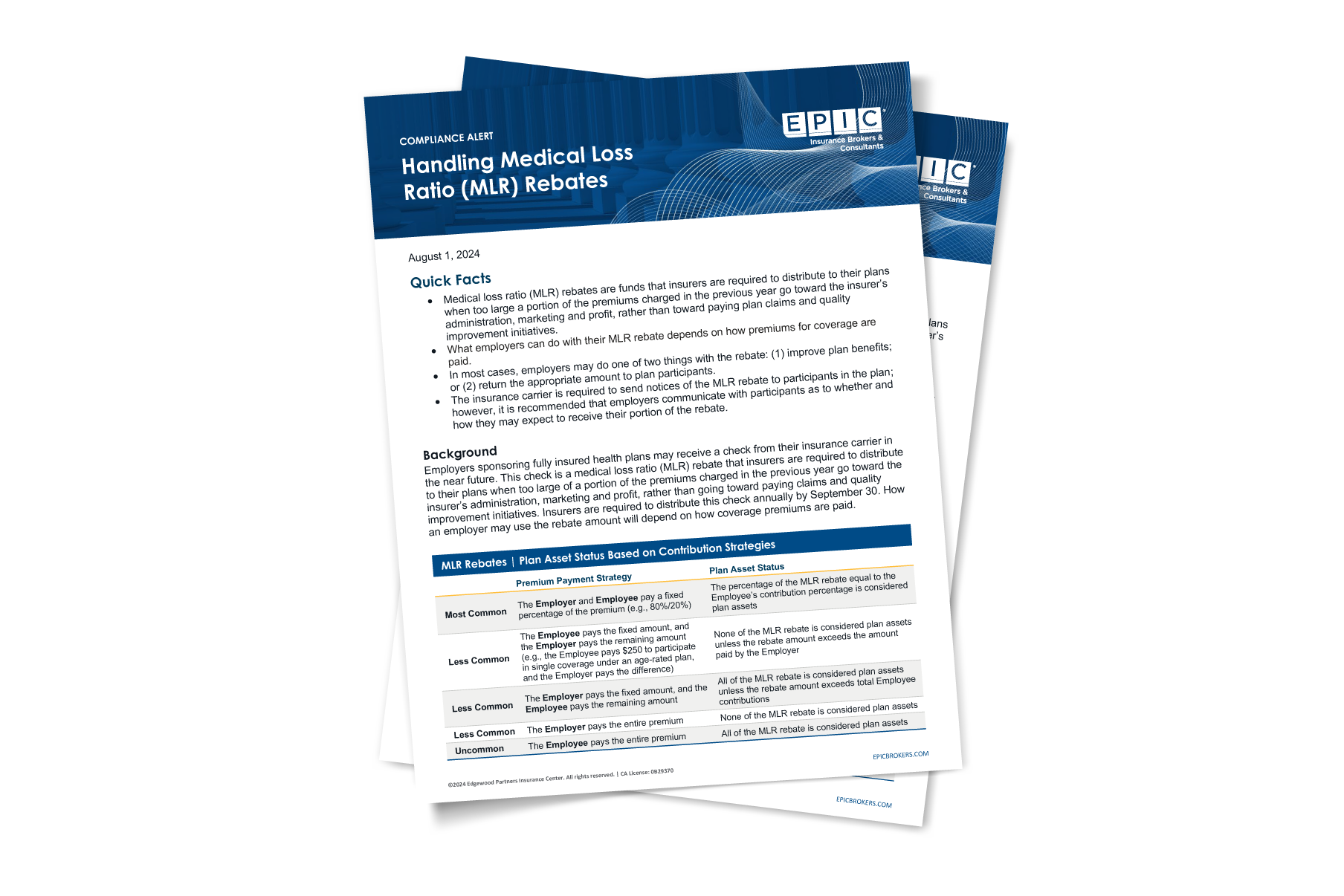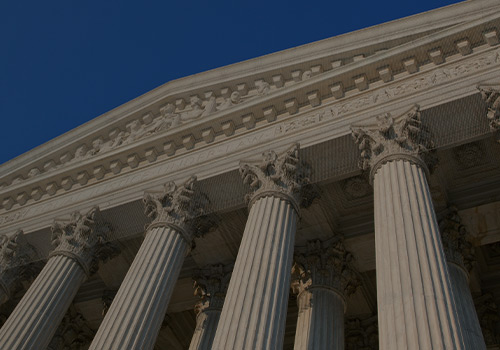Let our team help you navigate the ever-changing benefits compliance landscape each month. Check out this month’s latest alerts, additional updates, and resources hot off the press:
Employee Benefits Compliance Alerts
This month’s Compliance Matters newsletter provides a comprehensive review of the following topics. To obtain your copy, please use the form below to download.

- SCOTUS Upholds ACA Preventive Services Mandate
- Medicaid & CHIP Employee Benefits Considerations
- Compliance Considerations for GLP-1s for Weight Loss
- 2025 State Regulation Series: Illinois Passes New PBM Legislation that May Impact Self-Funded Health Plans
- Employee Benefits Litigation Series: Major PBMs Sue Arkansas Over New PBM Law
- Employee Benefits Litigation Series: Sixth Circuit Revives ERISA Claims Against BCBSM
Download this month’s alerts
Additional Updates & Resources
Reminder! PCORI Due July 31
Employers who sponsored self-funded medical plans that ended sometime during 2024 are required to report and pay the Affordable Care Act (ACA) Patient-Centered Outcomes Research Institute (PCORI) fees no later than July 31, 2025. Fully insured plan sponsors can rely on their carriers to submit the fee on their behalf, but fully insured plan sponsors that sponsor a self-funded plan component, such as a health reimbursement arrangement (HRA), will need to file and pay for the self-funded component plan.
Payment amounts due in 2025 will differ based on the employer’s plan year. The Internal Revenue Service (IRS) provides a chart showing applicable fee amounts depending on the plan’s year-end date. The fees due in July 2025 are as follows:
- $3.22 per covered life for plan years ending after September 30, 2023, and before October 1, 2024
- $3.47 per covered life for plan years ending after September 30, 2024, and before October 1, 2025
Self-funded plans may use one of three methods to determine the average covered lives used for reporting and paying the PCORI fee: (i) the actual count method; (ii) the snapshot method; or (iii) the Form 5500 method. There are special counting rules that apply to employers offering multiple self-funded plans or an HRA integrated with a fully insured plan. The PCORI fee count and payment are submitted using the IRS Form 720.
Reminder! Forms 5500 Due July 31 for Calendar Year Plans
Employee health and welfare plan administrators with at least 100 participants must file an Internal Revenue Service (IRS) Form 5500 each year by the last day of the seventh month after the end of the plan year, which means plan sponsors with calendar year plans must file annually by July 31.
Plan sponsors may file an extension, which delays the annual filing deadline for calendar year plans to October 15. For a list of Form 5500 frequently asked questions (FAQs) see our prior alert from July 2024.
HIPAA Reproductive Care Rules Vacated
On Wednesday, June 18, 2025, the U.S. District Court for the Northern District of Texas issued an order vacating most of the rules published in April 2024, which amended the Health Insurance Portability and Accountability Act (HIPAA), increasing protection under HIPAA for reproductive rights. For more information on the HIPAA reproductive healthcare rules, access our prior alert released in June 2024.
The amended rules were challenged by a healthcare provider who claimed that the rules unlawfully limited mandatory child abuse reporting and impermissibly redefined key terms. You can access the complaint Purl v. HHS here. The Texas court vacated all of the final rules, including the requirement to update the HIPAA Notice of Privacy Practices (NPP) to include reproductive healthcare protections, starting February 2026. Note, however, that updates to the NPP related to substance use disorder records with the same February deadline are still in effect.
HHS Files Appeal in ACA Penalty Lawsuit
On June 20, 2025, the Department of Health and Human Services (HHS) file a Notice of Appeal in the case Faulk Company Inc v. Health and Human Services. The appeal is in response to an April 2025 decision out of the United States District Court for the Northern District of Texas, that granted summary judgment in favor of the Plaintiff, and ordered the Internal Revenue Service to refund the Plaintiff more than $200,000 in Affordable Care Act (ACA) employer mandate penalties. For more information on the decision see our prior Alert from May 2025.
Senate Removes ICHRA and HSA Provisions from the Big Beautiful Bill
On Monday, June 15, 2025, the U.S. Senate released their version of the One Big Beautiful Bill in response to the House version released in May. For more information on the House version see our Alert from June 2025. Several employee benefits-related provisions, including changes to the Individual Health Care Reimbursement Arrangements (ICHRAs), enhanced Health Savings Account (HSA) flexibilities, and changes to the Centers for Medicare and Medicaid (CMS) Marketplace Proposed Rule are absent from the Senate bill. Congressional Republicans have been vocal about their goal to deliver their final bill to President Trump by July 4, 2025; however, with two very different versions of the bill in the two houses that might not be possible. EPIC will continue to monitor developments with this legislation and provide updates as they become available.
SCOTUS Rules in Transgender Care for Minors Case
The Supreme Court of the United States (SCOTUS) recently ruled in the case U.S. v. Skrmetti, upholding Tennessee’s law banning puberty blockers and hormone therapy for transgender minors. SCOTUS ruled that the law does not violate the Equal Protection Clause of the U.S. Constitution because the restriction applies regardless of a minor’s sex. This decision marks a significant departure from the Biden administration’s position supporting the challenge to Tennessee’s law and aligns more closely with the Trump administration’s stance reversing that support earlier this year. This ruling is expected to bolster similar restrictions in other states and signals a narrowing interpretation of equal protection in the context of gender-affirming care.
Federal Updates Provide Guidance for Transparency
Federal agencies recently provided new guidance and requests for information to strengthen the implementation and enforcement of healthcare transparency rules as directed by Trump’s Executive Order (EO) issued earlier this year. This does not change anything specific to employer compliance obligations but has the potential to provide further access to healthcare spend data. For more information about the EO, access our prior alert from April 2025.
- Machine-Readable Files. The Departments of Labor, Health and Human Services (HHS), and Treasury (the Departments) introduced Schema Version 2.0 for machine-readable files under the Transparency in Coverage Final Rule, aiming to reduce file size and improve clarity by eliminating duplicative data. In addition, a request for information (RFI) was issued to gather input on prescription drug machine-readable files, which are currently delayed pending further guidance. The RFI focuses on implementation challenges and potential alternatives and suggests regulations to implement the prescription drug portion of the machine-readable files requirement are in the works. Access this frequently asked questions (FAQ) guidance from the Departments for more information.
- Hospital Price Transparency. The Centers for Medicare and Medicaid Services (CMS) issued updated guidance for hospitals, requiring actual dollar amounts in pricing files instead of estimates. CMS also issued an RFI to gather input on how to increase compliance and ensure that accurate and complete data is shared.
Congressional Report on Preventive Coverage
On May 23, 2025, the Congressional Research Service (CRS) released a report detailing the current federal framework for preventive health services coverage. Under the Affordable Care Act (ACA), most group health plans are required to cover preventive services (e.g., immunizations, cancer screenings, and contraception) without cost-sharing, based on recommendations from several federal agencies. The report also explores the potential impact of ongoing litigation, including Braidwood v. Becerra, which challenges the ACA’s preventive mandate and could affect what group health plans are required to cover without cost-sharing. CRS emphasizes how these federal requirements intersect with public programs and payment systems, shaping the broader landscape of preventive care access.
Final Rule – 2025 Marketplace Integrity and Affordability
The Centers for Medicare & Medicaid Services (CMS) finalized a rule that may have a significant impact on individual health coverage available through public Marketplaces beginning in 2026. Amongst other things, the rule shortens the open enrollment window to Nov. 1 – Dec. 15 for federally-run Marketplaces and requires that no Marketplace offer an open enrollment longer than Nov. 1 – Dec. 31; increases eligibility verification and reconciliation requirements for premium tax credits; and adjusts the methodology used to set premiums. It is estimated that some of these changes may result in lower overall premiums and will reduce improper enrollments and payment of premium tax credits. However, the changes might also make it more difficult to obtain individual coverage and qualify for premium tax credits through public Marketplaces.
In addition to the Marketplace changes, the rule prohibits individual and small group fully insured plans from providing coverage for specified sex-trait modification procedures and provided the 2026 out-of-pocket (OOP) maximums for Affordable Care Act (ACA) group health plans. The 2026 maximum OOP is $10,600 for self-only coverage and $21,200 for other than self-only coverage (currently $9,200 and $18,400 for 2025).
California SB 729 Fertility Coverage Update
You may have heard rumors of a delay in the effective date of California SB 729, legislation that requires coverage of certain fertility services starting with plan years beginning July 1, 2025, and after. When Governor Newsom signed SB 729 he indicated that he wanted the legislature to delay the July 1, 2025, effective date. This did not happen through a bill during the regular session this year. The budget bill on the Governor’s desk for signature also does not include a delay. The only remaining legislation is what are known as trailer bills. A trailer bill was introduced in both the Assembly and Senate on June 24th containing the delay language. The allows both houses to have hearings at the same time. The bills have to be in print for 72 hours before a vote. Either version could get sent to the Governor. EPIC is monitoring developments with this legislation and in the event the effective date is delayed we will send an update.
For details on SB 729 see the CA Legislative Updates article in the November Alert.
San Francisco Updates HCAO Rates Effective July 1, 2025
On May 30, 2025, the San Francisco Office of Labor Standards Enforcement (OLSE) released new fee rates and weekly maximums for employers who make payments to the San Francisco General Hospital to satisfy requirements of the San Francisco Health Care Accountability Ordinance (HCAO), effective July 1, 2025.
Effective July 1, 2025, covered employers who make payments to San Francisco General Hospital to satisfy the requirements of the HCAO must pay $7.50 per hour, capped at $300.00 per work week. This rate is adjusted for inflation annually on July 1.
The HCAO applies to most San Francisco city contractors and tenants (including those at the San Francisco International Airport and the Port of San Francisco) and requires employers to offer a compliant health plan to their covered employees, to make payments to the City for use by the Department of Public Health, or, under limited circumstances, to make payments directly to their covered employees.
To offer a compliant health plan, an employer plan must meet all the HCAO Minimum Standards. Questions about complying with the HCAO can be directed to the Department of Public Health. Additionally, the OLSE offers a set of frequently asked questions on its website. For more information, visit the HCAO website.
Monthly FAQ: How do I calculate the PCORI for a short plan year?
In a short plan year, the fee itself is not prorated, but rather the amount of time used to calculate the fee is based only on the time employees were covered by the short plan year. The IRS provides this example in its frequently asked questions (FAQs): “The PCORI fee for the short plan year of an applicable self-insured health plan is equal to the average number of lives covered during that plan year multiplied by the applicable dollar amount for that plan year. Thus, for example, the PCORI fee for an applicable self-insured health plan that has a short plan year that starts on April 1, 2024, and ends on December 31, 2024, is equal to the average number of lives covered for April through December 31, 2024, multiplied by $3.47 (the applicable dollar amount for plan years ending on or after October 1, 2024, but before October 1, 2025).”

More Compliance Resources
- Sign up for our in-depth Compliance Webinars
- Learn about our Compliance Consulting Services

WANT TO GET COMPLIANCE MATTERS IN YOUR INBOX?
Sign up for the monthly newsletter.